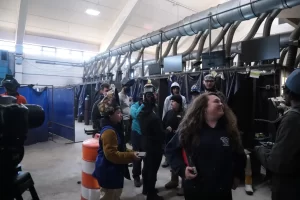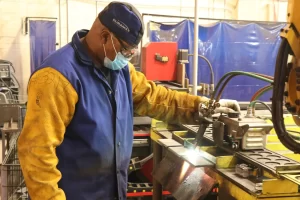A welding career as a welding engineer is primly important for the integrity of vehicles, machinery, buildings, and products demanding welds. The role of a welding engineer requires staying abreast with the latest technologies, current codes, and regulations regarding welding processes. A welding career always possesses a safe environment for employees.
A Welding Engineer is a professional who trains technicians to design, develop and maintain welding systems. They get employed in maritime, manufacturing, construction, and aerospace. The role demands technical as well as administrative skills for identifying practical welding designs and techniques.
A career as a welding engineer requires harnessing the latest techniques. They must assess processes and supervises welders functioning on a project. A welding engineer may also tweak the approach to make improvements.
A trade school welding helps these engineers to review documentation, procedures, and welding processes. They must be responsible for setting the requirement of welding projects, such as implementing design codes.
The work of a welding engineer generally involves analyzing and comprehending the welding requirements. They ensure the integrity of projects. These engineers must be required to direct outside test laboratories.
The welding engineer is used to coordinate welding projects. They track, report, conduct, and plan welding inspections. Additionally, welding engineers evaluate the qualification of welding processes and repairs to improve them or generate alternative welding solutions.
A welding engineer is responsible for supplying technical support to construction or related industry engineers. The welding training programs assist them to fabricates machines and equipment according to the applicable codes and clients’ requirements.
Most entry-level positions in welding engineering need at least a bachelor’s degree in welding engineering or materials engineering. Throughout this degree program, learners understand the properties of different materials.
Furthermore, they acquire substantial knowledge in operating special equipment. The bachelor’s degree program coursework comprises calculus, trigonometry, chemistry, physics, welding processes, design, and project management.

Some jobs demand candidates to own a master’s degree in the field of welding engineering. Topics are identical to those in a bachelor’s degree program, although they are studied in greater detail. Students can complete their studies at welding schools in Philadelphia that were approved by the ABET (formerly the Accreditation Board for Engineering and Technology).
Entry-level welding engineers may be employed directly from college. They might have to undergo a probationary period until they’ve acquired relevant experience.
Potential work environments comprise manufacturing plants, research laboratories, shipyards, oil pipelines, construction sites, and off-shore drilling platforms. Once a welding engineer has been on the job, they can take further examination to become a Professional Engineer.
The U.S. Bureau of Labor Statistics declares that all 50 states presenting their services directly to the public are required to gain a license. The welding engineer is considered a Professional Engineer after acquiring the license.
Candidates must hold a degree from a university authorized by ABET and four years of work experience to qualify to undertake the exam for a state license.
A welding engineer who desires to advance professionally can take a welding certification program to become a Certified Welding Engineer. This distinction represents that the person who holds it is qualified to handle welding operations according to customary industry standards.
These certifications differ from the PE and do not permit the holder to present services directly to the public. Nevertheless, such designations indicate refined field knowledge and may enable career prospects.
The national median salary of welding engineers in the U.S. $18.95 is per hour. The welding engineer’s work will also impact the amount the professionals receive. Experience and location are other factors that define the salaries of welding engineers.
For example, the pay is higher in some parts of the U.S.A than in others. Spring garden, Wynnfield Heights, Overbook Park, north Philadelphia, and south Philadelphia are among the states where welding engineers gain the highest pay.

A welding engineer is a kind of materials engineer involved with all welding elements that oversee the manufacture of a product. The welding process combines pressure and heat to fuse different elements of metal into one piece.
Through welding education, a welding engineer may research more useful welding techniques or design more compact equipment to benefit the welding process. They may also supervise manufacturing processes to assure quality control or assess inspection procedures.
These engineers can work in any industry and can choose their dream job. Thus, initiating a career as a welding engineer is one of the most lucrative career prospects out there.
Read More